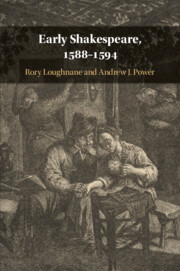Book contents
- Early Shakespeare, 1588–1594
- Early Shakespeare, 1588–1594
- Copyright page
- Contents
- Tables
- Notes on Contributors
- Acknowledgements
- Abbreviations
- Introduction Beginning with Shakespeare
- Chapter 1 Shakespeare and the Idea of Early Authorship
- Chapter 2 Collaboration and Shakespeare’s Early Career
- Chapter 3 The Language and Style of Early Shakespeare
- Chapter 4 Shakespeare’s Early Verse Style
- Chapter 5 Early Shakespeare, Chaucer, and Narrative Theory:
- Chapter 6 Poetry, Counsel, and Coercion in Shakespeare’s Early History Plays
- Chapter 7 John Lyly and Shakespeare’s Early Career
- Chapter 8 Spenser and Shakespeare: Bards of a Feather?
- Chapter 9 Arden of Faversham, Richard Burbage, and the Early Shakespeare Canon
- Chapter 10 Boy Parts in Early Shakespeare
- Chapter 11 The Origins of Richard Duke of York
- Chapter 12 Early Shakespeare and the Authorship of The Taming of the Shrew
- Chapter 13 Who Read What When?
- Book part
- Select Bibliography
- Index
Chapter 2 - Collaboration and Shakespeare’s Early Career
Published online by Cambridge University Press: 17 April 2020
- Early Shakespeare, 1588–1594
- Early Shakespeare, 1588–1594
- Copyright page
- Contents
- Tables
- Notes on Contributors
- Acknowledgements
- Abbreviations
- Introduction Beginning with Shakespeare
- Chapter 1 Shakespeare and the Idea of Early Authorship
- Chapter 2 Collaboration and Shakespeare’s Early Career
- Chapter 3 The Language and Style of Early Shakespeare
- Chapter 4 Shakespeare’s Early Verse Style
- Chapter 5 Early Shakespeare, Chaucer, and Narrative Theory:
- Chapter 6 Poetry, Counsel, and Coercion in Shakespeare’s Early History Plays
- Chapter 7 John Lyly and Shakespeare’s Early Career
- Chapter 8 Spenser and Shakespeare: Bards of a Feather?
- Chapter 9 Arden of Faversham, Richard Burbage, and the Early Shakespeare Canon
- Chapter 10 Boy Parts in Early Shakespeare
- Chapter 11 The Origins of Richard Duke of York
- Chapter 12 Early Shakespeare and the Authorship of The Taming of the Shrew
- Chapter 13 Who Read What When?
- Book part
- Select Bibliography
- Index
Summary
Recent scholarship has shown the increasing likelihood that Shakespeare’s very first work was collaborative, or at least that collaboration as a practice dominates his pre-1594 writing in ways that we are finally beginning to understand, something many chronologies of Shakespeare have failed to acknowledge satisfactorily. While the matter of firm dates for Shakespeare’s early work remains elusive, its collaborative nature must change both our conception of Shakespeare’s working practices in his early career as well as our sense of how collaborative writing may be better understood as part of his development as a literary and dramaturgical craftsman. This essay charts the various arguments for collaboration, canon, and chronology in Shakespeare’s early career, and proposes some ways of understanding how they map onto possible company affiliations in Shakespeare’s beginnings as a dramatist.
Keywords
- Type
- Chapter
- Information
- Early Shakespeare, 1588–1594 , pp. 54 - 75Publisher: Cambridge University PressPrint publication year: 2020



